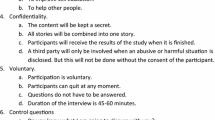Abstract
Individuals with an intellectual or developmental disability (ID/DD) may not have had the experiences to develop social skills for long term relationships. While society has denied the sexuality of these individuals, the individuals have identified their desire for intimate relationships. The purpose of this study was a qualitative inquiry to identify what individuals with ID/DD expect from a sex education program. A small sample size of three participants identified three themes. Data emerged for the future focus of sex education programs to include: friendship, relationships, and safe sex behaviors. The study also revealed methods of education to be used for the program setting. While the generalizability of the study is limited, due to the small number of participants, data from this study can be used for future inquires aimed at the identification of meaningful sex education programs for individuals with ID/DD.
Similar content being viewed by others
References
American Academy of Pediatrics: Assessment of maltreatment of children with disabilities. Pediatrics 108, 508–512 (2001)
Mansell, S., Sobsey, R., Moskal, R.: Clinical findings among abused children with and without developmental disabilities. Intellect. Disabil. 36, 12–22 (1998)
Sobsey, D., Varnhagen, C.: Sexual Abuse and Exploitation of People with Disabilities. Health and Welfare Canada, Ottawa (1988)
Sobsey, D.: Violence and Abuse in the Lives of People with Disabilities. Paul H. Bookes, Baltimore (1994)
Aylott, J.: Is the sexuality of people with a learning disability being denied? Br. J. Nurs. 8(7), 438–442 (1999)
Block, P.: Sexuality, fertility, and danger: Twentieth century images of women with cognitive disabilities. Sex. Disabil. 18(4), 239–254 (2000)
Jobling, A., Moni, K., Nolan, A.: Understanding friendship: Young adults with Down syndrome exploring relationships. J. Intellect. Dev. Disabil. 25, 235–245 (2000)
Owen, F., Griffiths, D., Feldman, M., Sales, C., Richards, D.: Perception of acceptable boundaries by persons with developmental disabilities and their care providers. J. Dev. Disabil. 7(1), 34–49 (2000)
Halstead, S.: Service-user and professional issues. J. Intellect. Disabil. Res. 46, 31–46 (2002)
Ward, K., Trigler, J., Pfeiffer, K.: Community services, issues, and service gaps for individuals with developmental disabilities who exhibit inappropriate sexual behaviors. Ment. Retard. 39(1), 11–19 (2001)
Nirje, B.: The normalization principle and its human management implications. In: Kugel, R., Wolfensberger, W. (eds.) Changing Patterns in Residential Services for the Mentally Retarded. Government Printing Office, Washington D.C (1972)
McCabe, M.: Sex education programs for people with mental retardation. Ment. Retard. 31(6), 377–387 (1993)
Morgan, H.: Choice denied or choice discovered. Nurs. Resid. Care 4(4), 178–181 (2002)
Lincoln, Y., Guba, E.: Naturalistic Inquiry. Sage, Beverly Hills (1985)
Stancliff, R., Parmenter, T.: The choice questionnaire: A scale to assess choices exercised by adults with intellectual disability. J. Intellect. Dev. Disabil. 24(2), 107–132 (1999)
King, E., Cheatham, D.: Health teaching for people with disabilities. Home Healthc. Nurse 13, 52–58 (1995)
Wolfensberger, W.: The Principle of Normalization in Human Services. National Institute on Mental Retardation, Toronto (1972)
Reid, D.: Sexual activity in people with learning disability. Br. J. Learn Disabil. 23, 56–58 (1995)
Heshusius, L.: Sexuality, intimacy, and persons we label mentally retarded: What they think-what we think. Ment. Retard. 20, 164–168 (1982)
Author information
Authors and Affiliations
Corresponding author
Rights and permissions
About this article
Cite this article
Swango-Wilson, A. Meaningful Sex Education Programs for Individuals with Intellectual/Developmental Disabilities. Sex Disabil 29, 113–118 (2011). https://doi.org/10.1007/s11195-010-9168-2
Published:
Issue Date:
DOI: https://doi.org/10.1007/s11195-010-9168-2



